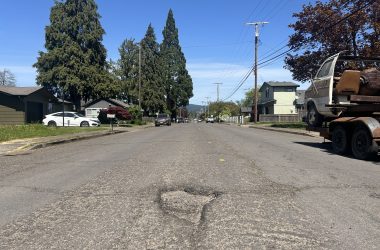SPRINGFIELD – A fifth treatment court will soon be up and running in the Eugene-Springfield area, but it won’t be anything Springfield has seen before.
The City was awarded a $900,000 grant at the beginning of the federal fiscal year, which was last October, and the Springfield Municipal Adult Rehabilitation and Treatment Court (SMART) now has funds pouring in from the U.S. Department of Justice, Bureau of Justice Assistance to support Springfield’s one-of-a-kind court.
There are four other recovery courts in the Eugene-Springfield area, but none of them solely focus on crimes within Springfield’s city limits, which sets SMART apart.
The grant will, “help support and implement a new program which hasn’t existed before,” said Erin Selvey, court program coordinator.
SMART will have a dual pronged approach for people to tackle their substance use or co-occurring disorder through, as Selvey explained, the ability to use both incentives and sanctions.
“Because research- and evidence-based programming has shown that relying more heavily on incentives can help make that a more effective program, that sort of approach is what we’ll have … to make sure that people have access to the services that can really help address the root causes of their behaviors,” Selvey said. “Those behaviors include: substance abuse or behavioral health disorders, lack of stable housing, lack of connection to education or employment.
SMART was established in November 2023 and operations began last month by reviewing referrals and hopes to increase caseloads throughout the year.
Selvey said the SMART team has an intensive training in March to ensure each of its potential issues are reviewed and addressed, allowing the program to start accepting clients as soon as possible. The training is led by All Rise: a national nonprofit which focuses on the training, membership, and advocacy for organizations within the justice system, which may address substance use and mental health disorders.
Treatment courts see an average reduction of 58% in recidivism and the community saves roughly $6,000 per participant, and Selvey said these numbers stem from the cost of incarceration and continued criminal behavior.
Every time someone is arrested, there’s a cost to the police department, the jail, and the community, she said.
“Treatment courts are really one of the first justice reform movements,” Selvey said. “There’s a revolving door sort of view sometimes of people who have criminal behaviors or are committing crimes. These types of programs really get at the root cause to try and stop that recidivism, to try to stop that criminal behavior, and get those individuals reconnected to their families and to their communities.”
The court will report back quarterly to the state on the court’s progress with statistics. The BJA grant expires after four years, and the City is exploring other grant opportunities to maintain SMART after its current grant disappears.








